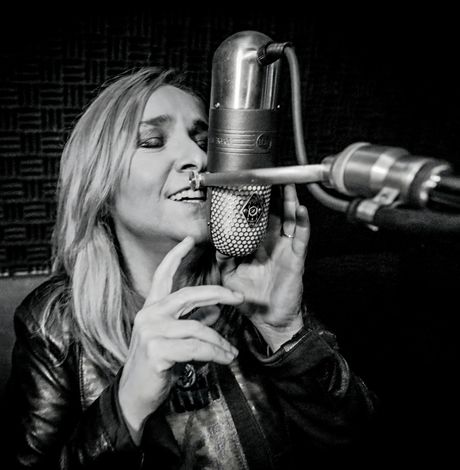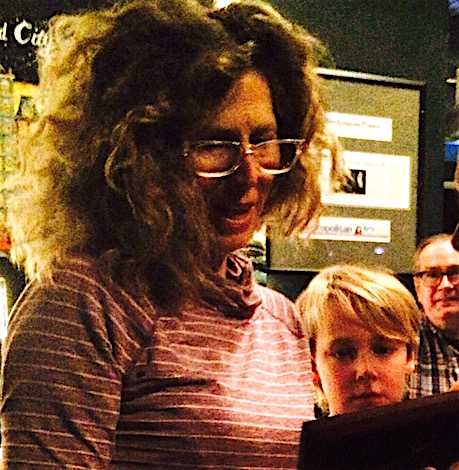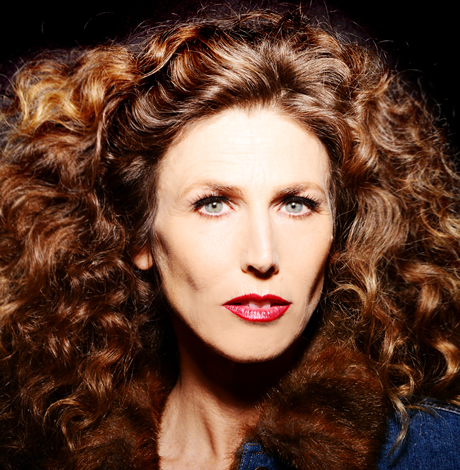Arts & Entertainment
Sophie’s choice
‘90s hitmaker returns after seven years with new album
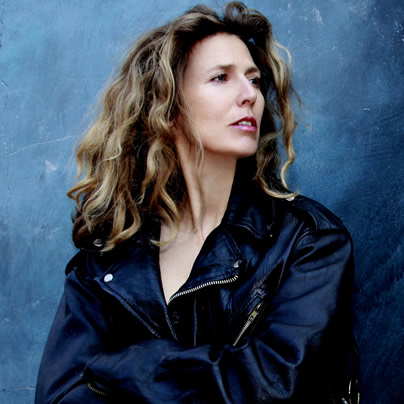
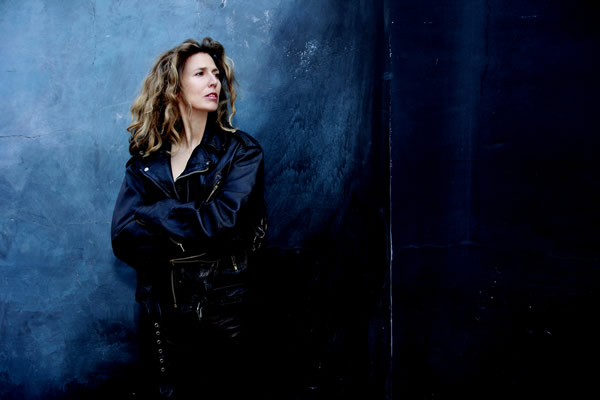
Sophie B. Hawkins released her first studio album in seven years last week. (Photos courtesy Trumpet Swan Entertainment)
How hard is it in this day and age to bounce back from a pop music career misstep? One likes to think pop culture — America ultimately voting with its pocketbook of course — eventually rewards and rediscovers the deserving.
One thinks of Kelly Clarkson who managed a comeback after the ill-advised downer (though it still went Platinum) 2007 album “My December.” And love her or hate her, Mariah Carey beat the odds with the monster-selling “Emancipation of Mimi” after her epic “Glitter” failure (both film and soundtrack).
But what if your supposed misstep isn’t even a bad album? Sophie B. Hawkins was well on her way to establishing distinguished career by the end of the ‘90s. She was red hot right out of the gate — “Damn I Wish I Was Your Lover,” which hit No. 5 on the Billboard Hot 100 in 1992, is a defining song of the era. She was nominated for the Best New Artist Grammy that year (co-nominated with Billy Ray Cyrus, Kriss Kross and Jon Secada; Arrested Development won). She survived the sophomore jinx with another mammoth hit “As I Lay Me Down,” a VH-1 staple from her second album “Whaler” that peaked at No. 6 during a 44-week run on the Hot 100 and a whopping 67 weeks (six at No. 1) on the AC chart. Unless you were in a convent that year, you heard it many, many times.
With that kind of start, the sky was conceivably the limit and expectations ran extremely high for her 1999 follow-up, “Timbre.” But trouble loomed — it’s a famous story, actually: Hawkins’ then label (Sony) only reluctantly released first single “Lose Your Way” with a banjo accompaniment. They argued it was poison for pop radio. Hawkins said it was essential. Though re-released independently in 2001 and followed by an indie follow-up called “Wilderness” in 2004, Hawkins lost her commercial, but not her artistic, footing. “Wilderness” turned out to be an unfortunately apt title — she spent years wandering.
Perhaps this wasn’t a total surprise, though. Anybody who’d paid attention knew Hawkins had a wild streak. She shimmied and writhed like a woman possessed on her duet with Melissa Etheridge on the latter’s VH-1 special in 1995 with a slate of then-hot female singer/songwriters like Joan Osborne, Jewel and Paula Cole. Those who caught Hawkins in concert knew of her penchant for the unconventional. As her audiences got smaller, her jeans got more shredded, her stream-of-consciousness stage meanderings more fluid. She wrangled memorably with Howard Stern about why she doesn’t shave her legs.
Though she’s long shunned labels for sexual orientation, the fact that she’s been in a same-sex relationship with filmmaker Gigi Gaston for several years (Gaston’s “The Cream Will Rise” follows Hawkins on an early tour) is one of the more conventional aspects of her persona. And it’s easy to forget that her wildly eclectic albums are full of intricately crafted and sometimes epic, sometimes disarming power pop that at times rivals Joni Mitchell’s best stuff for complexity and lyrical depth — check out “Mysteries We Understand,” “Only Love” “Help Me Breathe” and “I Need Nothing Else” especially.
Her hit singles are only part of the story. An early MusicHound review said, “Dig (further) than (the hits) and her abilities to seamlessly weave in and out of jazz, folk and dance, all driven by a kind of tribal percussion sensibility (emerge).”
But Hawkins, now 44, is starting to sound her age. Not vocally — her singing still has the luster that struck her chart gold all those years ago, but her insights during an hour-long phone chat last week show a woman who’s thought long and hard about life, pop culture popularity cycles, music making in the Internet age and much more. With no apparent time constraints, Hawkins gamely goes anywhere the questions take her and beyond, from hair tips and why she’s a dog person to the deeper story behind the banjo battles and her still-complicated relationship with her mother (explored memorably in “Cream”). The impetus for all this is her interminably delayed new album “The Crossing,” her first collection of new material in seven years, which dropped last week.
“People were always telling me, ‘Oh, you sold out with ‘Tongues and Tales,’ or, ‘Oh, you sold out with ‘Whaler.’ I’m not saying ‘Tongues and Tales’ was just art for art’s sake, but that was really the best I could to try and reach people,” Hawkins says. “Those albums were the least weird I could possibly be. You want your music to reach people, you want it to get out there to as many as possible, otherwise it’s too isolating. It’s like masturbation, you’re not doing it with anybody.”
Hawkins considers herself part of a group of ‘90s women singer/songwriters — she mentions Paula Cole and Tori Amos as peers — who barely “squeezed through” the music industry gate before the doors shut altogether, from the advent of file sharing to endless label buyouts that left precious few major players in the game. Yes, there are still women hitmakers — Rihanna, Adele — but they’re few and far between and getting younger all the time.
“I think everybody knew what was going to happen, the chilly winds were already blowing,” she says. “I felt with the first album like, ‘Wow, I really got away with something’ in spite of all this. Then with ‘Whaler’ it felt like that again, although that was really the beginning of the fight. … In the ‘90s, it really started turning against the individual artist into this totally corporate thing in every way. It was like, ‘Oh, I’m with this group, I’m with that group, this is Sophie’s sound, this is the lesbian sound, the country artist, the right wing, the left wing — I feel like several of us just barely squeaked through in spite of all that.”
And yes, some of that line of thinking is what’s led Hawkins to shun traditional LGBT labels.
She admits she and Gaston have been in an exclusive relationship (Gaston is also her manager), but says a lack of general perception of nuance causes her to avoid certain language.
“It’s because nobody listens,” Hawkins says. “They just want to say it, and shut up and not hear any more about it. I love the word bisexual but it has such a negative connotation, I don’t know why. It’s like this big, scary thing for people so I’ve tried to come up with something that’s what I really think I am … I’m definitely not heterosexual or homosexual, I love men and women equally and passionately. I’m just having a relationship right now with a woman and I think there are very few men I could have a relationship with. I’m a very singular person. I’m committed to this woman, but if I were not, I’d probably be alone.”
The years since “Wilderness” have not been inactive for Hawkins. She became a mother — her son with Gaston, Dashiell, is 3. She popped up at the Grammys pre-show as a presenter, campaigned avidly for Hillary Clinton’s presidential campaign, released several singles along the way including one (“The Land, the Sea and the Sky”) as a benefit for the Waterkeeper Alliance, an environmental group.
She released a live album and her song “Life is a Bomb” was on the soundtrack for the 2011 Garry Marshall film “New Year’s Eve,” a feat Hawkins says was wildly against the odds. She also tweaked “The Crossing” endlessly as the years went by and various proposed release dates came and went. Hawkins says it’s “a miracle” the album came out at all.
She also worked with Gaston on a musical for Kristin Chenoweth that’s on hold until Chenoweth’s producer of choice is available and she has high hopes for an October musical in Los Angeles (Hawkins lives in Venice, Calif., and has been on the West Coast for more than a decade) in which she’ll star as Janis Joplin.
Hawkins says she knew instinctively, she was supposed to do the Joplin piece.
“My reaction was just, ‘Yes,’ and I never say yes to anything right away. I just think there’s something I can do with Janis that will speak to every creative person out there who feels overlooked or treated in a way that’s not fair. … If we can get this ball in the basket, I have a good feeling about this, I think it could be a slam dunk. It will be so relevant to now, it really gives me a freedom I cannot even tell you.”
Hawkins guesses, counting the Chenoweth musical and “The Crossing” material, she’s written about 300 songs in the last seven years. The album will include acoustic remakes of “Damn” and “As I Lay Me Down.” Hawkins has a distribution deal with EMI for the release.
Hawkins says she’s a huge dog lover because she could never have one as a kid. She loves them because there’s “no barrier” to their affection and presence.
Of her trademark abundant tresses, Hawkins says her only hair care tip is to avoid washing it as much as possible. She insists hers looks best when it’s been weeks since the last shampoo.
“That’s when I always get the most compliments, people saying ‘Oh, you have such great hair.’”
She’s also realistic about “The Crossings” commercial prospects. She says she’ll never stoop to giving her music away but realizes the chances of duplicating her early chart success are practically nil.
On one hand, Hawkins says her art (she paints too) is something she “couldn’t not do.” Conversely, she says it’s Gaston who has urged her to continue against increasingly difficult industry and commercial odds.
“She’s so much more than a manager,” Hawkins says. “Things bother her more than they bother me. Oh, believe me, I would have just gone away by now and written and painted by myself if it weren’t for her. I don’t think I could have survived but she tells me, ‘You’re not giving up, you’re a great artist, it kills me that people don’t see this.’ She really takes it on as one of her missions.”
So in hindsight, was the banjo battle worth it?
Hawkins says the story has gotten oversimplified as a kind of cautionary tale for supposedly overambitious pop singers — as in, “Remember Sophie B. Hawkins? Look what happened to her.”
She says it was more an issue of increasing pressure to write songs in huge groups of collaboration Hawkins found unwieldy and artistically stifling. She says she would have agreed to remove the banjo line for the radio version and kept it on a remix or B-side version (“Believe me, all those scenarios were discussed”), but push came to shove when label execs put their foot down over her using it for a live TV appearance.
“It was really the straw that broke the camel’s back,” she says. “It was such a clear thing to me. They were taking away my horse, in a way. I thought, ‘I can’t ride into battle without my horse. I can’t win without the horse.’ It just made me realize we weren’t on the same team anymore. … They were no longer rooting for me to win, they were trying to destroy me.”
Hawkins says she’s learned to find rewards in non-traditional places. Even though her relationship with her mother is still every bit as complicated as it was portrayed in “Cream,” Hawkins says there are sparks of healing and inspiration there too.
“There are artistic people out there struggling who never make at all,” she says. “So when somebody tells me they get it, it’s like winning an Oscar. My mother called me the other day and told me she’d listened to the new album. She said she’d felt it, whatever it was, this profound thing in the music. If your parents are alive and you get that, that’s my Grammy.”
Out & About
The Rare Book Fair is coming to D.C.
Over 35 antiquarian booksellers from across the country to attend

The Capital Rare Book Fair will bring more than 35 antiquarian booksellers from across the country to D.C. from Friday, May 3 to Sunday, May 5 at the historic University Club at 1135 16th St., N.W.
This year, the fair will take over two floors in the illustrious mansion on 16th Street and showcase thousands of beautiful, notable, and rare books, maps, and historic documents from around the globe. Exceptional examples that will be offered include leaf 27 of a 40-leaf xylographic Biblia pauperum, a picture Bible from 1465 for $85,000 from Bruce McKittrick Rare Books, among many other intriguing selections.
Tickets are $50 and more information is available on the event’s website.

Friday, April 19
Center Aging Friday Tea Time will be at 2 p.m. on Zoom. This is a social hour for older LGBTQ adults. Guests are encouraged to bring a beverage of choice. For more information, email [email protected].
Go Gay DC will host “Drag Pageant” at 8 p.m. at Freddie’s Beach Bar and Restaurant. Net proceeds from this event will benefit EQUALITY NoVa, the local nonprofit organization dedicated to advancing equality in Northern Virginia. Attendance is free and more details are available on Eventbrite.
Saturday, April 20
LGBTQ People of Color Support Group will be at 1 p.m. on Zoom. This peer support group is an outlet for LGBTQ People of Color to come together and talk about anything affecting them in a space that strives to be safe and judgment free. For more details, visit thedccenter.org/poc or facebook.com/centerpoc.
Go Gay DC will host “LGBTQ+ Brunch” at 11 a.m. at Freddie’s Beach Bar & Restaurant. This fun weekly event brings the DMV area LGBTQ community, including allies, together for delicious food and conversation. Attendance is free and more details are available on Eventbrite.
Sunday, April 21
Go Gay DC will host “LGBTQ+ Dinner” at 7 p.m. at Federico Ristorante Italiano. Attendance is free and more details are available on Eventbrite.
AfroCode DC will be at 4 p.m. at Decades DC. This event will be an experience of non-stop music, dancing, and good vibes and a crossover of genres and a fusion of cultures. Tickets cost $40 and can be purchased on Eventbrite.
Monday, April 22
Center Aging: Monday Coffee & Conversation will be at 10 a.m. on Zoom. This is a social hour for older LGBTQ adults. Guests are encouraged to bring a beverage of their choice. For more details, email [email protected].
Tuesday, April 23
Pride on the Patio Events will host “LGBTQ Social Mixer” at 5:30 p.m. at Showroom. Dress is casual, fancy, or comfortable. Guests are encouraged to bring their most authentic self to chat, laugh, and get a little crazy. Admission is free and more details are on Eventbrite.
Genderqueer DC will be at 7 p.m. on Zoom. This is a support group for people who identify outside of the gender binary. Whether you’re bigender, agender, genderfluid, or just know that you’re not 100% cis. For more details, visit genderqueerdc.org or Facebook.
Wednesday, April 24
Job Club will be at 6 p.m. on Zoom. This is a weekly job support program to help job entrants and seekers, including the long-term unemployed, improve self-confidence, motivation, resilience and productivity for effective job searches and networking — allowing participants to move away from being merely “applicants” toward being “candidates.” For more information, email [email protected] or visit [email protected].
Asexual and Aromantic Group will be at 7 p.m. on Zoom. This is a space where people who are questioning this aspect of their identity or those who identify as asexual and/or aromantic can come together, share stories and experiences, and discuss various topics. For more details, email [email protected].
Thursday, April 25
The DC Center’s Fresh Produce Program will be held all day at the DC Center for the LGBT Community. People will be informed on Wednesday at 5:00 pm if they are picked to receive a produce box. No proof of residency or income is required. For more information, email [email protected] or call 202-682-2245.
Virtual Yoga with Charles M. will be at 7 p.m. on Zoom. This is a free weekly class focusing on yoga, breath work, and meditation. For more details, visit the DC Center for the LGBT Community’s website.
Movies
After 25 years, a forgotten queer classic reemerges in 4K glory
Screwball rom-com ‘I Think I Do’ finds new appreciation

In 2024, with queer-themed entertainment available on demand via any number of streaming services, it’s sometimes easy to forget that such content was once very hard to find.
It wasn’t all that long ago, really. Even in the post-Stonewall ‘70s and ‘80s, movies or shows – especially those in the mainstream – that dared to feature queer characters, much less tell their stories, were branded from the outset as “controversial.” It has been a difficult, winding road to bring on-screen queer storytelling into the light of day – despite the outrage and protest from bigots that, depressingly, still continues to rear its ugly head against any effort to normalize queer existence in the wider culture.
There’s still a long way to go, of course, but it’s important to acknowledge how far we’ve come – and to recognize the efforts of those who have fought against the tide to pave the way. After all, progress doesn’t happen in a vacuum, and if not for the queer artists who have hustled to bring their projects to fruition over the years, we would still be getting queer-coded characters as comedy relief or tragic victims from an industry bent on protecting its bottom line by playing to the middle, instead of the (mostly) authentic queer-friendly narratives that grace our screens today.
The list of such queer storytellers includes names that have become familiar over the years, pioneers of the “Queer New Wave” of the ‘90s like Todd Haynes, Gus Van Sant, Gregg Araki, or Bruce LaBruce, whose work at various levels of the indie and “underground” queer cinema movement attracted enough attention – and, inevitably, notoriety – to make them known, at least by reputation, to most audiences within the community today.
But for every “Poison” or “The Living End” or “Hustler White,” there are dozens of other not-so-well-remembered queer films from the era; mostly screened at LGBTQ film festivals like LA’s Outfest or San Francisco’s Frameline, they might have experienced a flurry of interest and the occasional accolade, or even a brief commercial release on a handful of screens, before slipping away into fading memory. In the days before streaming, the options were limited for such titles; home video distribution was a costly proposition, especially when there was no guarantee of a built-in audience, so most of them disappeared into a kind of cinematic limbo – from which, thankfully, they are beginning to be rediscovered.
Consider, for instance, “I Think I Do,” the 1998 screwball romantic comedy by writer/director Brian Sloan that was screened last week – in a newly restored 4K print undertaken by Strand Releasing – in Brooklyn as the Closing Night Selection of NewFest’s “Queering the Canon” series. It’s a film that features the late trans actor and activist Alexis Arquette in a starring, pre-transition role, as well as now-mature gay heartthrob Tuc Watkins and out queer actor Guillermo Diaz in supporting turns, but for over two decades has been considered as little more than a footnote in the filmographies of these and the other performers in its ensemble cast. It deserves to be seen as much more than that, and thanks to a resurgence of interest in the queer cinema renaissance from younger film buffs in the community, it’s finally getting that chance.
Set among a circle of friends and classmates at Washington, D.C.’s George Washington University, it’s a comedic – yet heartfelt and nuanced – story of love left unrequited and unresolved between two roommates, openly gay Bob (Arquette) and seemingly straight Brendan (Christian Maelen), whose relationship in college comes to an ugly and humiliating end at a Valentine’s Day party before graduation. A few years later, the gang is reunited for the wedding of Carol (Luna Lauren Vélez) and Matt (Jamie Harrold), who have been a couple since the old days. Bob, now a TV writer engaged to a handsome soap opera star (Watkins), is the “maid” of honor, while old gal pals Beth (Maddie Corman) and Sarah (Marianne Hagan), show up to fill out the bridal party and pursue their own romantic interests. When another old friend, Eric (Diaz), shows up with Brendan unexpectedly in tow, it sparks a behind-the-scenes scenario for the events of the wedding, in which Bob is once again thrust into his old crush’s orbit and confronted with lingering feelings that might put his current romance into question – especially since the years between appear to have led Brendan to a new understanding about his own sexuality.
In many ways, it’s a film with the unmistakable stamp of its time and provenance, a low-budget affair shot at least partly under borderline “guerilla filmmaking” conditions and marked by a certain “collegiate” sensibility that results in more than a few instances of aggressively clever dialogue and a storytelling agenda that is perhaps a bit too heavily packed. Yet at the same time, these rough edges give it a raw, DIY quality that not only makes any perceived sloppiness forgivable, but provides a kind of “outsider” vibe that it wears like a badge of honor. Add to this a collection of likable performances – including Arquette, in a winning turn that gets us easily invested in the story, and Maelen, whose DeNiro-ish looks and barely concealed sensitivity make him swoon-worthy while cementing the palpable chemistry between them – and Sloan’s 25-year-old blend of classic Hollywood rom-com and raunchy ‘90s sex farce reveals itself to be a charming, wiser-than-expected piece of entertainment, with an admirable amount of compassion and empathy for even its most stereotypical characters – like Watkins’ soap star, a walking trope of vainglorious celebrity made more fully human than appearances would suggest by the actor’s honest, emotionally intelligent performance – that leaves no doubt its heart is in the right place.
Sloan, remarking about it today, confirms that his intention was always to make a movie that was more than just frothy fluff. “While the film seems like a glossy rom-com, I always intended an underlying message about the gay couple being seen as equals to the straight couple getting married,” he says. “ And the movie is also set in Washington to underline the point.”
He also feels a sense of gratitude for what he calls an “increased interest from millennials and Gen Z in these [classic queer indie] films, many of which they are surprised to hear about from that time, especially the comedies.” Indeed, it was a pair of screenings with Queer Cinema Archive that “garnered a lot of interest from their followers,” and “helped to convince my distributor to bring the film back” after being unavailable for almost 10 years.
Mostly, however, he says “I feel very lucky that I got to make this film at that time and be a part of that movement, which signaled a sea change in the way LGBTQ characters were portrayed on screen.”
Now, thanks to Strand’s new 4K restoration, which will be available for VOD streaming on Amazon and Apple starting April 19, his film is about to be accessible to perhaps a larger audience than ever before.
Hopefully, it will open the door for the reappearance of other iconic-but-obscure classics of its era and help make it possible for a whole new generation to discover them.
-

 Africa5 days ago
Africa5 days agoCongolese lawmaker introduces anti-homosexuality bill
-

 District of Columbia2 days ago
District of Columbia2 days agoReenactment of first gay rights picket at White House draws interest of tourists
-

 World5 days ago
World5 days agoOut in the World: LGBTQ news from Europe and Asia
-

 District of Columbia1 day ago
District of Columbia1 day agoNew D.C. LGBTQ+ bar Crush set to open April 19

